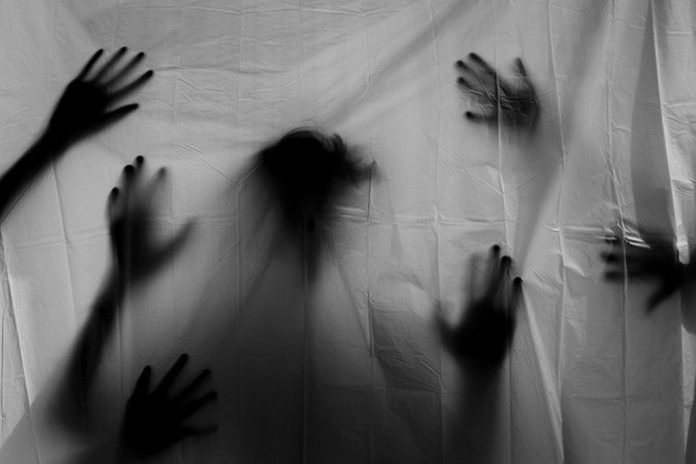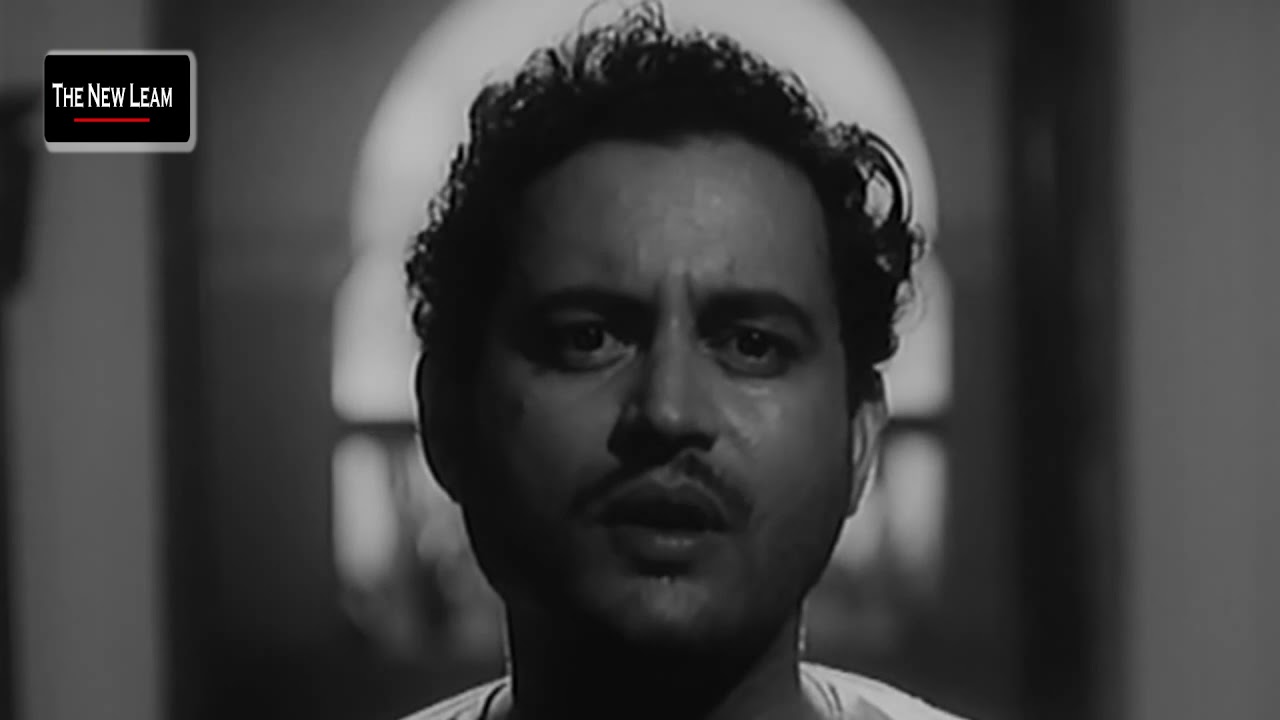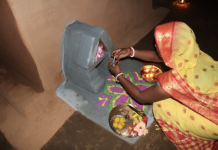
“Horror” as represented in films and shows today contains an ostracized form of fear, separate from the subject experiencing it; the cause of which is something evil, probably otherworldly and unidentifiable by nature and of nature (hence, supernatural). The experience of horror in general encapsulates an ordeal, an overcoming of the self, much like what Nietzsche says, “How can I rise above when I haven’t first become ashes.” But the way horror movies represent this struggle is a reflection of a particular understanding of what is “horror”: something that not only poses threat to human mind and body but also to the collective we call family or society; its rules and laws, its cultural ethos.
Most of the popular movies or shows have a commonplace storyline of a family moving into a new house, which is actually an old one, previously inhabited by the weirdest of families. Each of the members who are already going through personal struggles and are distanced from each other, encounter some paranormal force in their newly occupied house and the adventure ensued therein brings them close together. There is still, catharsis (or pleasure) in witnessing such an overcoming.
One cannot help but understand this supernatural force as a reification of the evil within, some monster you must kill or banish, or at least, learn to tame, before it sucks the life out of you, completely. Yet I find the presence of this Christian idea that evil is always conquered by some divine force, either by God himself or his earthly representation in the form of a priest’s faith or a mother’s love, intriguing. Mothers extraordinarily determined to protect their children or priests, in order to protect their faith, assume some extra terrestrial power, equal or greater than the mystical forces haunting their place. The Biblical idea, “…work out your salvation with fear and trembling…” as presented in ‘The Exorcism of Emily Rose’, alludes to the inevitable ordeal and overcoming of the self through it.
The chaos that could be seen in lives of these characters is no longer there after such consternation as the center of the conflict shifts elsewhere, outside interpersonal relationships. The conflicts that arise between a husband and a wife, or parents and children, or among siblings and friends, are based on a deeply rooted fear of loss – loss of trust, faith and more importantly, love. This loss is detrimental to the acknowledgement of fear because it refers to a pre-existing memory of love, which is brought to life in the later parts of this struggle, as in “the Conjuring”, the only weapon that helps saving Carolyn is the memory of a happy day at the beach with her girls.
But what is distinctive about this idea of love is that it is the point that makes the subject, most vulnerable. This vulnerability is extremely real and very much pertinent in the present day experiences of modern families.
We, as members of a family are not able to identify the inexplicable forces haunting our lives, not even able to locate where they exist because the power that governs these forces is neither visible nor stationary, it changes its form every time one tries to aim at it but its presence can be felt through the constant negotiation it puts us into, as an individual or as a member of a collective, with the outer world. There is cognizance of such a conflict but the inability to locate the centre of the conflict entraps families into a never ending, self deprecating process. These forces haunting us today function on this particular mechanism – feeding off our unnatural fear, exploiting this inherent darkness to cast a spell of oblivion all around us, where we no longer identify the difference between home and society, religion and politics, violence and resistance, life and death. There is a dissolution of all boundaries. It’s the same trick that a demon plays on the minds of the possessed to take them away from their realities, to make them do things that they would not have imagined themselves doing otherwise. Even more appalling is the inability to bring this discomfort into expression, as what Zizek says, “…we lack the very language to articulate our unfreedom”.
Yet there are movies like Ari Aster’s “Hereditary”, that tell us that family, when looked at in isolation brings forth a considerable amount of terror off its own accord. A family itself is scary. Living with people whom you have no reason to trust; on the contrary, the collective of a family is so overwhelming that the individual freedom of expression finds no space in it. In a highly personalized world, family takes away even the minimal space kept aside for individual emotions. It is also the sphere where love becomes binding, exhausting and each one finds no reason to preserve this love for the other but expects the other to provide it for him. It is the point where the personal is not only obfuscated but rather characterized by the social and the political.
“The family, as the immediate substantiality of mind, is specifically characterised by love, which is mind’s feeling of its own unity. Hence in a family, one’s frame of mind is to have self-consciousness of one’s individuality within this unity as the absolute essence of oneself, with the result that one is in it not as an independent person but as a member.”
-Hegel, Philosophy of Right
Whether to locate this movie as a reflection of an outside force manifesting itself into the familial space or to see it as a new perspective in the understanding of fear itself, in dimensions never looked at before, is a significant question to ask. If movies like ‘The Conjuring’ or ‘Annabelle’ indoctrinate that the evil that exists outside is a reflection of the fear within and needs to be cast out with a little bit of faith and love; then there is a movie like “Hereditary” that emphasizes on the pervasive, inexplicable force that ruthlessly exploits the fear that already thrives in an oppressive institution like Family. Yet the movie fails to justify the exploitation of this fear which is very much real in our everyday familial experiences, without the help of an evil supernatural force.
Another crucial element of this tribulation is the bearing of a sense of loss. Loss of one’s soul, peace of mind, or in some cases loved ones, an element of sacrifice that this struggle of preservation inextricably requires. A loss that you must overcome, in order to preserve what is left, more or less takes our ideals in different directions, as we are never in consensus over what needs to be preserved and what to let go, especially in a world which is deceitful. It is not a deceit that would be rightfully punished in the end but which, with its ghostliness fills in the hollowness of this world and its inhabitants. As a result, the channels those connect the ‘I’ with the ‘other’ are already broken, even before ‘I’ can be recognized.
“There looms, within abjection, one of those violent, dark revolts of being, directed against a threat that seems to emanate from an exorbitant outside or inside, ejected beyond the scope of the possible, the tolerable, the thinkable.”
– Julia Kristeva, Powers of Horror
Call it the ghost or the impenetrable force, expounding the ‘horror’ in movies or in real life, is not plainly deceitful; it is a form of abjection, an element that a subject cannot perceive fully as an object, such that this realization is reflected back into the subject as a forfeited object. In other words, one’s sense of loss, repudiation of that loss and lack of expression of such a loss appears in the form of an illusion, a symbolic, a piece of fiction that must compensate for what lacks in language and thereby provide an opportunity for conflict resolution.
So a possessed victim lingering between the two worlds is urged to fight, remember the love that would successfully resolve the conflict and bring her back to the earthly realm. This memory of a pleasure becomes vital to break the duality or ambiguity or heterogeneity of this shape-shifting evil force. Hence, even though what begins to haunt a family as a whole ends up being a personal struggle for each member, something that was fairly well displayed in the Netflix show “The Haunting of Hill House”. Five siblings in a house go through separate versions of the same haunting and each one responds to it differently, primary defense mechanisms being denial, anger, fear, depression and acceptance. It is important for them to be able to “read the signs”, i.e. to understand the difference between reality and fiction, or better said, to be able to locate the fiction of reality, manifested to them in the form of the “Red Room”.
It is in the identification of the self through the broken link between I and other, through the repulsion caused by this brokenness, this lack of an object or in Kristeva’s terms, presence of an “ab-ject”, that there emerges a pathological hope for reconciliation of the self.
Horror as a genre and what it has come to represent in the world today has had a history but it still continues to be run in the extremes, people rather negate the horrifying aspect by transmuting it into Comic or indulge with a sublime pleasure inherent in it that can only be experienced by accepting what is repugnant about it. Whatever remains in between is food for thought and fright of the soul.
Shrimansi Kaushik is pursuing her Masters in English Literature from Delhi University.













